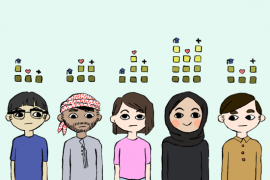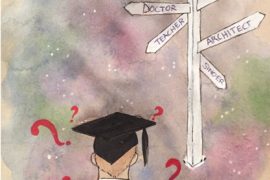Article in Brief: The author looks at how the current school systems are not conducive to learning Arabic while also receiving a good education.

In my last article, I wrote about how the Arabic language and culture are issues that need to be addressed separately, and my emphasis was on culture. This month, I’m shifting the focus to the Arabic language as there has been increasing concern across the nation regarding its diminishing use.
This was discussed at length in an FNC session late last year, and plans were made to impose government laws to preserve the language. These discussions looked at how the majority of students in both private and public schools were excelling in English but had unsatisfactory results in Arabic.
Other reports have looked at how most expatriates in the UAE feel there is no real need to learn Arabic, as they can easily get by in their daily interactions using English alone. This is also true for Emiratis, being a minority, and surrounded by English all around. This is compounded by the fact that the UAE has a large number of expatriates, with the highest population being Indians, whereby Hindi is also widely used as a result.
However, the bigger issue surrounding the lack of Arabic learning is the quality of education provided in the school system. Many reports have indicated that the availability of well-qualified Arabic teachers and a strong education system is limited. This seems to be the main reason why many parents, including Emiratis, are now choosing private schools for their children, and willing to forego the Arabic language.
I am currently reviewing different schools that I could enroll my children in, and although I want to ensure that they fully learn and use the Arabic language, I have unfortunately found that Arabic teaching schools and quality education don’t go hand in hand. I have shared these concerns with many other parents, and it seems to be a common dilemma, where we are forced to choose between preserving the language or giving our children a solid education.
When my parents were making that choice for me, they opted for quality, and I am immensely grateful for that because it opened up a world of opportunities and growth for me, yet it all came with a price as I now carry the shame of not being able to communicate in Arabic. But I have to ask, why does it have to be a choice between language and quality?
An example is when I recruit Emiratis for various positions at work, I have found that those who have been to private schools and have strong English communication skills sometimes go further in their careers, and have more opportunities available to them. Yet, when we recruit students from Arabic schools, we find that many of them are not equipped to handle their new roles. The workforce is a cutthroat place with strong focus on globalization, and in the race for quality, we have far more options available to us with the English language.
This is not a phenomenon limited to the Arab world, as English has infiltrated other parts of the world too, and has become the common global language. Therefore, the focus on English in the education system should prevail, yet, there should also be a revamp with the Arabic language, to instill the love of learning for generations to come. The level of quality in the education system needs drastic improvement, so that learning Arabic can be fun and effective. We need to encourage reading and writing in Arabic from a young age, and incorporate it into our daily life. Its use should be encouraged in schools, the workplace, and beyond, so that both citizens and expatriates appreciate its value.
Parents should hold the responsibility of encouraging the use of the Arabic language, by speaking the language, reading books, etc., but schools also play a pivotal role. It is through their education that children can learn to write effectively in Arabic and use it at a much higher level. Similarly, for children of non-Arabs, they can only learn and build their Arabic language skills at school. The FNC has subsequently stated that Arabic needs to be the official first language of education in all institutes and that it should be used in all federal, local, and private entities.
Making these changes will be a long and arduous task, but it is something that needs to be done collectively if we want to have the right mix of our cultural roots and global openness. Preserving our language and getting the best education shouldn’t be a choice, it should be the way of life.
References:
- Ola Salem (November 25, 2014). “Law Planned to Preserve Arabic Language in the UAE”. The National. Retrieved 8 April 2015. http://www.thenational.ae/uae/law-planned-to-preserve-arabic-language-in-the-uae
- National Editorial (March 2, 2015). “Emirati Children Must Know Their Mother Tongue”. The National. Retrieved 8 April 2015. http://www.thenational.ae/opinion/editorial/emirati-children-must-know-their-mother-tongue
- National Editorial (November 26, 2014). “Solid Bilingual System Would Bolster Arabic in the UAE”. The National. Retrieved 8 April 2015. http://www.thenational.ae/opinion/editorial/solid-bilingual-system-would-bolster-arabic-in-the-uae
- Bahar Al Awadhi (April 1, 2015). “Without Roots, We Cannot Grow”. Sail eMagazine. Retrieved 8 April 2015. https://sailemagazine.com/2015/04/without-roots-we-cannot-grow/




1 Comment